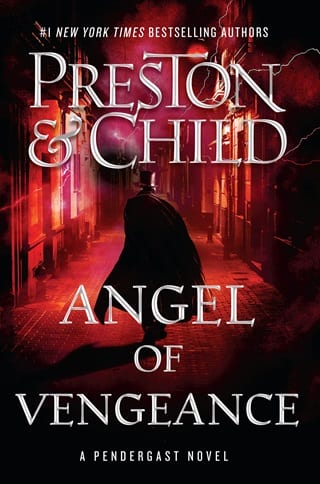62
62
D IOGENES DID NOT HAVE long to wait. Within fifteen seconds, he saw a small flash of intense light at the top of the tower, which was instantly engulfed in a fast-expanding gray cloud. He opened his mouth and covered his ears, motioning for Cato to do the same.
The real shock came a split second later, as the sound of the explosion—twenty eight-inch cylinders of black powder, releasing 10 megajoules of energy—burst from the tower's crown, a wave of overpressure and sound so powerful it took on a physical presence, shooting outward across the park, the traffic circle, and the surrounding walls of buildings to the east and north. Though he'd pressed his hands to his ears, the blast was nevertheless painful. As he looked around, feeling the ground tremble under his feet, he could see that—almost as if with the flip of a switch—the relative calm of a quiet winter sunset had been transformed into chaos. Pedestrians staggered or fell to the ground. Horses reared and whinnied, some breaking free from stunned coachmen and rushing this way and that, colliding with other carriages or overturning them. Dandies in evening dress threw themselves into manure-clogged gutters. Lower windows along Central Park South imploded in sequence, as if at a cadet review. A surprising number of people drew pistols from places of concealment. Under the stroke of his calming caress, Diogenes felt Bad Influence tense. He was concerned the horse might bolt, not out of fear but out of excitement, thinking—after being long conditioned to loud reports at the track—that a race had begun. But Cato held him steady, and as a reward he reached into his pocket and fed the horse a watermelon-flavored sugar drop.
After the passage of the wave of overpressure, Diogenes closed his mouth and looked up again. A black cloud was thrusting like a fist into the sky, along with bits of debris that tumbled even higher, lit from below.
And then the second explosion went off, tearing away the top part of the structure, adding more fuel to the growing conflagration. Diogenes, ears uncovered now, could hear the full power of this report ring off the buildings around him, a thunderclap that echoed and reechoed over Central Park, ricocheting from one line of buildings back to the other. He felt immensely gratified. A third explosion blasted out the middle part of the remaining tower, rocking the ground and prompting still more screaming, firing of shots, and crashing of glass.
And then the fourth and final detonation tore out the lower sides of the structure, sending another series of echoes booming down the stone canyons and shattering whatever nearby windows remained intact. At this, the unflappable Cato glanced over at Diogenes, raising one eyebrow as if to ask out of mild curiosity: How long is this to continue? Diogenes smiled and shook his head. Study to be quiet , he signed in return, quoting Paul but thinking with equal irony of Izaak Walton, and the admonition with which he'd closed The Compleat Angler .
The rumbling died away, while the ruins of the observation tower were rapidly engulfed in fire. Another sound rose up: a loud patter as a rain of grit and debris began to come down around him.
The first three sets of charges had destroyed the framing in the upper section of the tower. The final, fourth charge had been detonated where the brick cladding ended. But the brickwork encircling the lower half, along with the structural steel supporting it, now performed Diogenes's second purpose: that of a chimney. A huge column of sparks and embers from the burning wooden beams within mounted up several hundred feet, the bottom of the tower turned into an eight-story kiln. The only comparison that came to his mind was that of a monstrous afterburner. Glancing upward at the tower of fire and sparks, Diogenes saw to his satisfaction that the engine he'd created was coloring the bellies of the gathering clouds with an angry orange glow.
This was a signal that no one within a hundred miles could miss.
There was nothing more to do. Like the watchman in Agamemnon , he'd lit the beacon, heralding the news: his assignment complete, it was up to its intended witnesses to act. Time to return to Smee's Alley. He saw the chaos in the street was only growing worse—they'd better hoof it before the route became impassable.
Back to the alleyway, please , he said in ASL to Cato as he gave Bad Influence a final pat and made for the carriage door. Cato nodded and stepped up into the driver's seat.
Another thing , Diogenes signed, leaning out from the step, one hand on the window frame. Once all this calms down, we'll celebrate with a drink.
And with that, he slid into his seat and closed the door as the cab lurched forward. Cato had yet to fully appreciate the virtues of absinthe, but—like Livia—he had the makings of a model pupil.
D'Agosta, sitting moodily in the iron cell, heard the turn of a lock. Then the door opened—but to his surprise, the party that had come to take Pendergast downstairs was now reduced to two: a single guard and Pendergast himself, a revolver held to the guard's head.
Thirty seconds later, D'Agosta had stepped outside and the guard had replaced him as resident. Pendergast slammed and locked the door behind him, then pocketed the key.
"How in the hell—? " D'Agosta began in a loud whisper.
"I made a loop with your shoestring, slipped it into the handcuff lock, lassoed the lock screw, and then drew the pin back. An old Houdini trick. Well, not old , yet, but… Listen, we must hurry—we have very little time."
"Time for what?"
But Pendergast was already moving along the hallway, and the question remained unanswered.
 Fullepub
Fullepub 



